课文语言点(unit 1)
Unit 1 Using language 语言点高中英语人教版(2019)选择性必修第一册
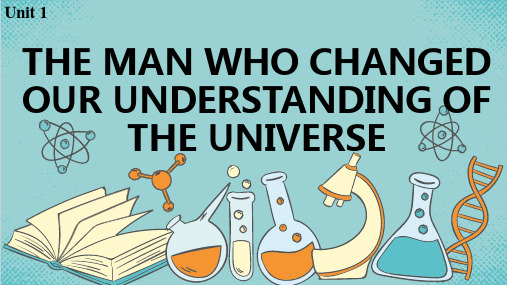
adj.勇敢的,有胆量的
kind figure loved by many people.
n.数字(符号);身材;人物 v.(以重要地位)出现;理解,弄懂
爱因斯坦不仅是一个天才,还是一个勇敢而善良的人, 受到许多人的喜爱。
Para.2
adj.温柔的,文静的
This gentle genius was born in Germany on 14 March
1. The work ___fi_n_i_s_h_e_d__ (finish), they left the office and went home.
2. The exam ___t_o__b_e_h__e_ld__ (hold) tomorrow, I couldn’t go to the
cinema tonight.
经过多次这样的场合后,他终于开始说:“对不起! 对不起!我总是被误认为是爱因斯坦教授!”
Para.6 It + be + V.-ed+ that… 据报道
On 18 April 1955, it was reported that Einstein had passed
away, and the whole world mourned the great loss of a v.哀悼;忧伤
解释,意见
n. 宇宙,天地万物 uni(一个)+vers(转向)+e(统一旋转)
改变了我们对宇宙认识的人
Para.1
非限定
Albert Einstein, who is perhaps the greatest scientist in
主语
谓语
consider v. 考虑;认为;体贴
Unit1语言点分析
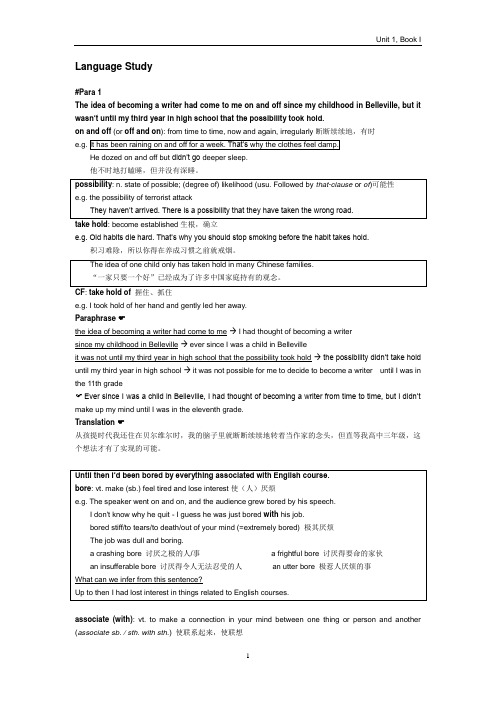
Language Study#Para 1The idea of becoming a writer had come to me on and off since my childhood in Belleville, but it wasn’t until my third year in high school that the possibility took hold.on and off (or off and on): from time to time, now and again, irregularly断断续续地,有时He dozed on and off but didn’t go deeper sleep.他不时地打瞌睡,但并没有深睡。
take hold: become established生根,确立e.g. Old habits die hard. That’s why you should stop smoking before the habit takes hold.积习难除,所以你得在养成习惯之前就戒烟。
CF: take hold of握住、抓住e.g. I took hold of her hand and gently led her away.Paraphrase ☞the idea of becoming a writer had come to me → I had thought of becoming a writersince my childhood in Belleville → ever since I was a child in Bellevilleit was not until my third year in high school that the possibility took hold →the possibility didn’t take hold until my third year in high school → it was not possible for me to decide to become a writer until I was in the 11th grade☞Ever since I was a child in Belleville, I had thought of becoming a writer from time to time, but I didn’t make up my mind until I was in the eleventh grade.Translation ☞从孩提时代我还住在贝尔维尔时,我的脑子里就断断续续地转着当作家的念头,但直等我高中三年级,这个想法才有了实现的可能。
高中英语必修课---Unit 1 A land of diversity语言点知识讲解及巩固练习题
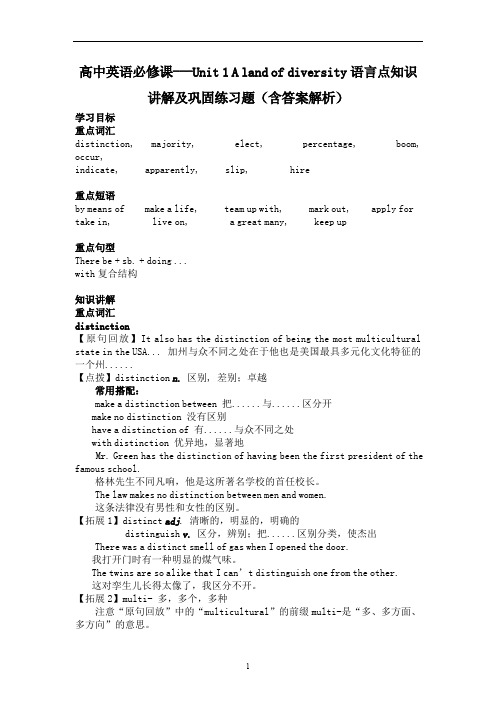
高中英语必修课---Unit1A land of diversity语言点知识讲解及巩固练习题(含答案解析)学习目标重点词汇distinction,majority,elect,percentage,boom, occur,indicate,apparently,slip,hire重点短语by means of make a life,team up with,mark out,apply for take in,live on,a great many,keep up重点句型There be+sb.+doing...with复合结构知识讲解重点词汇distinction【原句回放】It also has the distinction of being the most multicultural state in the USA...加州与众不同之处在于他也是美国最具多元化文化特征的一个州......【点拨】distinction n.区别,差别;卓越常用搭配:make a distinction between把......与......区分开make no distinction没有区别have a distinction of有......与众不同之处with distinction优异地,显著地Mr.Green has the distinction of having been the first president of the famous school.格林先生不同凡响,他是这所著名学校的首任校长。
The law makes no distinction between men and women.这条法律没有男性和女性的区别。
【拓展1】distinct adj.清晰的,明显的,明确的distinguish v.区分,辨别;把......区别分类,使杰出There was a distinct smell of gas when I opened the door.我打开门时有一种明显的煤气味。
必修四 Unit 1 Women of achievement language points 语言点

only+状语“+部分倒装 只有这样,我们才能学好英语。 Only in this way_______________________. can we learn English better 到那时我才意识到我的错误。 Only then did _______________________. I realize my mistakes 但Only +主语时不倒装 只有你了解我。 understand me. Only you _______________
inspired by this book. 3. I am _________
He was an ____ D poet at that time and his ____ poems spread through all the country.
A. inspired; inspired
B. inspiring; inspired
spend … on sth. spend… (in)doing sth. pay some money for sth. 他花800元买了一辆自行车。 He spent 800 yuan (in) buying a bike. He spent 800 yuan on a bike. He paid 800 yuan for a bike.
C. inspired; inspiring
D. inspiring; inspiring
Only after her mother came to help her for the first few months was she allowed to begin her project. (L18) 在她母亲头几个月来帮忙后,她才得以开始 自己的计划。 将only及其后面的状语提前放在句首,句子要 用部分倒装语序,即将be动词、助动词或情态 动词放在主语之前。
人教版高中英语必修1unit1课文知识点详解
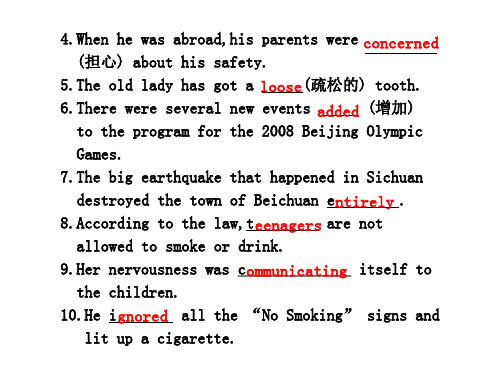
归纳总结 add v.增加,添加;补充说。 add up sth./add sth.up把……加起来 add up to加起来共计/达(不用于被动语态) add to增加,增添(后多接抽象名词) add...to...把……加到/进……里 add that...补充(说)…… 即学即用 His returning home safe and sound adds to her pleasure (使她倍感欢喜).
I’m not concerned with that matter any longer. 我和那件事再也没有关系了。 He called on all concerned to take an active part in the movement. 他呼吁所有有关的人积极地参与这场运动。 归纳总结 concern n.[U]关心,担忧;[C]关心的人(或) 事;vt.涉及,关系到,参与;(使)担心,(使)操心。 be concerned with sth.和……有关 be concerned about sth.担心/关心某事
(为此事烦恼). (2)Don’t upset yourself about it (你别为这
事烦恼了) —let’s jusern
You will tell your friend that you are concerned about him/her and you will meet after class and talk then.(回归课本P1) 观察思考 There is now considerable concern for their illness. 现在(人们)对他们的病情相当担心。 She is always concerning herself about other people’s business. 她总是关心别人的事情。
新编英语语言教程Unit One语言点

Unit 1Text II. Writing Skills1.Narration (primary purpose):experience of an interview2.Sequence: time. (It is written in the order which the events occurred)Application ----Fear ----Interview3.Description (not lengthy, does not carry much weight)The description contributes to the main purpose of narration, convincing the reader of the unpleasantness of his first job interview. It helps to make the narrative more vivid.①Journey: awkward/ a long way from home/ inconvenient transportation / hot②Surroundings:Outside the school building: dreary house/ dust/ fumes from a busy main roadInside the school building: smell of the cabbage / dingy/ ink marks/ crumbs on the carpet③Impression of the headmaster: unpleasant appearanceII. Language Points1.advertise①advertise (v.)vt.e.g. Do salesmen ~ their goods?Where do people ~ their products?They ~ their products in newspapers or on TV.vi.~ fore.g. The family will ~ for a servant.People usually ~ for their lost properties in a newspaper or on a billboard②advertiser (n.)③advertisement (n.) = ade.g. The store has an ~ in the newspaper for a special sale.Have you ever received ~s in your mailbox?cf. commercial (n.)---an advertisement on television or radio (电视、广播之) 广告2. in a suburb: a part of the suburbsin the suburbs: all or one of the outlying district of a citye.g. Is our university in the city or in the suburbs?Is Shipai a suburb of Guangzhou?He planned to build a house in the suburb of Shanghai.cf. outskirts (n.) (通常指郊外适合于散步的地方)---(esp. of a town) the outer areas (常用于in the outskirts 片语) 尤指城镇郊区;郊外---the outer limits (常用于on the outskirts 片语中) 边界e.g. We live in the suburbs.The children have been out for the day to some green spot on the outskirts.3. be short of: have not enough; lack ;be in need ofbe short on: be poorer at, be not so good at 在…稍差,在…较欠缺e.g. The book has good information, but rather short on illustration.She is a nice person, but short on looks.4.apply①apply (v.)a) request~ to sb. for sth.e.g. If you want to go abroad, you may ~ to the Consul for a visa.He has applied to the banker for a loan.I will ~ to the boss for the position in person, not by letter.b)put into use or into position to serve its purpose 应用~ sth. to sth.e.g. He applies a sticking plaster to the cut.Do you ~ your knowledge to the practice?The teacher will ~ the rule to every student.~ oneself / one’s energy/ one’s mind to sth./ doing sth.---concentrate one’s thoughts on a taske.g. We must ~ ourselves to our study.Paraphrase:He concentrates himself on learning French .If you try your best to do the job, you will soon finish it.②applicant (n.)③application (n.)make an ~ to sb. for sth.e.g. We made an ~ to the court for inquiry.The manager has received 20 ~s for the position.5.degree①rank or grade given by a university to one who has passed an exame.g. Bachelor of Arts / Science (BA/ BS)Master of Arts /Science (MA/ MS)Doctor of Philosophy (PH.D) 哲学博士Doctor of Science / Medicine / Law②to/ in …degree 等级,程度e.g.. To what degree can he be trusted?He cannot be trusted in the slightest degree.6. land①go, come, put on land; bring to lande.g. The plane ~ed safely.The pilot ~ed the airliner.②bring to reach a positione.g. He ~ed himself in great difficulties.③get (informal)e.g. If I manage to ~ the job, I will stand you all a free drink.He ~ed a valuable prize.7. chances of: (often plural with singular meaning) possibility; likelihood thatsth. will happene.g. You would have more chances of catching the train if you got a bus to the station instead ofwalking.Note: chances of doing sth. = hopes of doing sth.a chance of doing sth. / to do sth. = the opportunity to do sth.8. slim (adj.)e.g. ~ hopes / chances of successa ~ excusea ~ girl: a slender girl9. summon: demand the presence of; call~ sb to sth. / ~ sb. to do sth.e.g. The manager ~ed the shareholders to a general meeting.She ~ed a servant.The teacher ~ed me to the office.They ~ed three women to appear as witness 传唤证人cf.summons (n.) 传票10. prove (proved, proved/ proven)----to show (oneself or itself) afterwards, in the course of time or experience, etc. to be of the quality; turn out to bee.g. He proved (himself) to be a coward.As it happened, my advice proved to be wrong.On the long journey, he proved himself to be an amusing companion.The article has proved (to be) most useful.= The article is proved (to be) most useful. / People proved the article most useful.He proved a real friend.It proved a waste.proof①proof (n.)I believe what you say; I don’t want any proof.②proof (adj.)be ~ againste.g. The tent material is ~ against water.a waterproof coat / a bulletproof car / a soundproof room / a shockproof watch11. as a result : in the ende.g. As a result , he was given a good jog.He broke his leg, as a result, he had to stop his studies.as a result of : because ofe.g. As a result of the war, other events occurred.He is unable to go to work as a result of the fall from his horse.He was late as a result of the snow.12. depress----to lessen the strength of; to sadden; discourage 使不振作;使不景气e.g. Rainy weather always ~es me.Her sad news ~ed me all day.depressed 作表语e.g. Since her baby died, she has been so depressed that she cries at the least thing.He recalled his last evening with his fiancée whenever he felt depressed.depressing 作定语e.g. a depressing weathera depressing incident on my way to work13. survive①survive (v.)a) vi. ---to continue to live, esp. after coming close to deathe.g. Of those wounded in the battle, only 3 ~d.He is the only man who ~d after the explosion.b) vt. ---to continue to live after 经过…活下来,幸存e.g. Only a few soldiers ~d the battle.Only ten of the crew ~d the shipwreck.Did anyone ~ the earthquake?vt. ---live longer thane.g. The man ~d his sister by 3 years.Insurance statistics show that most wives ~ their husbands.②survival (n.)a) [u] ---survivinge.g. The ~ of even a few made people grateful to God.His ~ is still uncertain; he has been very badly hurt and may die.b) [c] ---a person or sth. that remains or survivese.g. The old man is a ~ from my great-grand mother’s days.③survivor (n.) (of accidents)e.g. There were 2 ~s of the air crash.This man was one of the ~s from the earthquake.14. moustache : on the upper lipcf. beard : hair of lower part of the face (excluding moustache)15. a freckled forehead = a forehead with freckles onfreckle (v./n.)e.g. Some people freckle more easily than others.16. look at sb. with an air of …/ do sth. with an air of…air: appearance; mannere.g. He speaks with an air of importance / success / surprise / sadness / excitement.17. to do one’s shoelaces = fasten one’s shoelaces18. smell (smelled / smelt)①vt. e.g. She smelled the meat to see if it was fresh.②vi. e.g. We smell with our nose.③link v. e.g. The dish smells good④vi. ~ of…有…的味道e.g. Your breath smells of brand.The air smelled of paint.19. go: to become (by a natural change, or by changing on purpose)(自然的或故意的)变成,使变成e.g. She is going grey. / Her hair is going grey.The milk went sour.He has gone mad/ blind.He went white with anger.20. proceed①proceed (vi.): go forward to 前进~ to sth.e.g. Please ~ to the next light, and then turn left.Let’s ~ to business. 着手工作Don’t stop! Proceed please.~ to do sth. = begin and continue to do sth.e.g. He ~ed to tell me the matter.After drinking a cup of tea, mother ~ed to cook the dinner.As soon as he came in, he ~ed to tell us all his troubles.~ with = go on withe.g. Let’s ~ with our workThe politician waited for the applause to die down and ~ed with his speech.~ from = result frome.g. The whole trouble ~ed from a misunderstanding.~ against = charge against 控告②proceeding (n.) 活动,进行情况e.g. He wrote an account of the ~s of the meeting.21. GSC = GCE (General Certificate of Education)CSE = Certificate of Secondary Education.Both are public examinations standardized to give national comparability. GCE is usually intended for pupil of an academic basis, usually those who want to enter a university.22. vital (adj.)①connected with livingHe was wounded in a vital part.②supreme, very important23. attach①attach (v.)a) fasten or join one thing to another~ sth. toe.g. I will ~ a label to my luggage.He ~ed a document to the letter.There is a house with a garage ~ed.There is a middle school ~ed to our university.b) consider to have; connect with~ importance / significance toe.g. Do you ~ much importance to what he said?The old man did not ~ much importance to the question.They ~ed significance to his speech.be /become attached to 变得喜欢, 依恋, 对…有感情e.g. She is ~ed to her home.Are you ~ed to this university?②attachment (n.)a) connectione.g. The ~ of a machine is easy.b) part attached 附件e.g. A machine has many~s.c) attached feelingse.g. She has a great ~ to her sister.Do you have a great ~ to your mother?24. singular①singular (adj.)a) uncommon, strangee.g. Don’t make yourself so ~ in your dress. 不要穿奇装异服b) outstanding 非凡的e.g. He is a man of ~ courage.c) (gram.) of the form used in speaking or writing of one person or thing.②singularly adv.)a) particularly 极b) strangely; in an unusual way奇异地③singularity (n.)a) strangeness [u]b) sth. unusual or sth. strange [c]25 .consist of: be made up of (no passive)paraphrase: Our class is made up of 28 students.This book has 18 units.26. range from …to : vary between limitse.g. Prices for books range from 10 cents to 100 dollars.The age of the students ranges from 22 to 25.range in … from…to…e.g. The books range in prices from 10 cents to 100 dollars.The students range in age from 22 to 25.27. appal①appal (U.S. also appall )----fill with fear or terror, shock deeply 惊吓,使惊吓~ sb.e.g. The news appalled me.be appalled at / by…: be shocked bye.g. I was appalled at the news.②appalling (adj.)---terrible; cripple, bad 蹩脚,糟糕e.g. The news was ~.Mary is an ~ cook.③appallingly (adv.): terribly; verye.g. The figures of employment are ~ high.We got ~ hungry working so late.28. split (split, split, splitting)①(vt.) divide into partse.g. They ~ the money between themselves.Let’s ~ the cost of the dinner party.The robbers ~ the loot evenly.The family agreed to ~ the estate.He ~ (up) the book into 5 chapters.I will ~ up the class into groups.②(vt./vi.) break or cause to break, be brokene.g. When he bent over, he ~ his pants.The water pressure ~ the pipe.The lightening ~ the tree.Don’t ~ our organization.Some kinds of wood ~ easily.The board ~ as I sawed it.~ on: give away the secret to one’s disadvantage 告密~ on sth. / sb. to sb. 向…告…的密e.g. The boy ~ on me to the teacher.Don’t ~ on him to his father.~ one’s sides (with laughter): laugh with movements of the sidese.g. They ~ their sides at the joke.I ~ my sides at the story.a ~ second: a brief instant of timee.g. It happened in a ~ second.a splitting headache: so severe that it feels that one’ head may crack29. incompetent: adj. not qualified or able 不合格的,不胜任的be competent/ incompetent at sth./ doing sth.e.g. He is incompetent at his job.He is incompetent at working with his hands.be competent / incompetent to do sth.e.g. He is quite incompetent to be the leader.be competent/ incompetent at sth.e.g. He is competent at all the subjects.be competent/ incompetent for sth. 称职/不称职e.g. He is competent for his job.be competent/ incompetent as sth.e.g. He is competent as a teacher.incompetence (n.)e.g. He was dismissed for incompetence.30. constitute①constitute (v.)a) form/ make up/ be 构成e.g. The best of 3 games ~s a win. 三盘两胜How many departments ~ our university?b) establish建立(制度/机构)e.g. We must ~ good traffic regulations.②constitution (n.)a) the way in which sth. is made upe.g. The ~ of a society is not simple.b) the body of laws and principles according to which a country is governed 宪法e.g. According to American Constitution, presidential elections are held every 4 years.c) the general condition of a person’s body or mind 身心状况(体质)e.g. The old man still has a strong ~.John has a very healthy ~.31. ultimate (adj.)①(not formal) greatest, after which no other can be considerede.g. Ultimate authority is exercised by the King.He has done stupid things before, but to look for the escaping gas with a match was the ~ silliness.②last or farthest distance, being at the end or happening at the ende.g. Becoming president is his ~ goal.Their ~ victory is not in question.32. indignity (antonym: dignity)e.g. The indignity of having to say sorry to a woman is unbearable.the indignities of an illness: such as being washed and dressed by someone else33. diffidentthe antonym of diffident: confidentdiffidence (n.)34. the last straw/ the straw tha t breaks the camel’s back---something in addition to a set of troubles which makes them at lasttoo much to bear 经过一系列打击或不愉快的事又无法忍受的事e.g. The hotel was expensive, the food was poor and the bad weather was the last straw.He couldn’t get the job, being laughed at was the last straw.35. prospect (n.)①[u] reasonable hope of something happening; expectation. 希望,展望,可能性e.g. There is not much ~ of my being able to see you before next month.There is no ~ of my success.②something that is expected 前景,展望之物e.g. Our ~s about the play are good.There is a ~ of a change in the weather.36. leisure①leisure (n.)可作定语“空闲的”e.g. ~ time/ occupationsat leisurea)作表语,“有空”= be freee.g. I only meant that when you are at leisure, you might think the matter over.I am quite at leisure if you want me to do anything for you.b)作状语,“从容地,慢慢地”=without haste; leisurely(adv.)e.g. I put off writing to you till today that I might write at leisure.The doctor directed me to live more leisurely.We talked as we walked leisurely along.②leisurely (adj.)e.g. We had a leisurely meal.He did everything in a leisurely manner.Grammar: 评论性的分词短语(comment participial phrase)A comment participial phrase is used in a sentence as a comment about the statement. In such a structure, the doer of the verb in the phrase is not identical with the subject of the sentence. This is how a comment participial phrase is different from one which acts as an adverbial in the sentence.e.g. Considering the amount she paid, the cat was dear in more ways than one.(If we consider the amount she paid, the cat was dear in more ways than one.)Judging from what you say, he has done his best.(If we judge from what you say, we can find that he has done his best.)There are only 10 apples here, not counting the bad ones.(If we don’t count the bad apples, there are only 10 apples here.)III. Questions on Text I1.What advertisement did the writer see in the newspaper?2.Why did he apply for the job?3.Was he confident that he would get the job?4.When did he receive a reply?5.What was the letter about?6.How was the journey to the school?7.Did the writer like the environment of the school?8.Did the writer like the headmaster?9.Was the headmaster’s appearance pleasant? What did he look like?10.Did the headmaster show his hospitality to the writer? What was the headmaster’s attitudetowards the writer when he saw him?11.Where did the headmaster interview the writer?12.Was the room pleasant?13.What questions did the headmaster ask the writer?14.Did the writer think games were very important in children’s education? How about theheadmaster?15.Did the writer think he had much in common with the headmaster?16.Did the writer get the job? How do you know?17.Was there a playground in the school? Where do the children play?18.Did the writer like the teaching set-up? Why?19.How much was the salary that the headmaster offered to the writer?20.What was the worst thing of the job? Why?IV. Translation1.要一个人专心致力于一份枯燥无味的工作是很艰难的。
Unit One The Great Wall 语言点

◆used to do ______________ ◆be used to doing_______________ ◆be used to do _______________ ◆e.g. 他小的时候过去常常游泳。 He ______ ______ swim when he was young. ◆年轻的妇女习惯于晚饭后散步。 The young woman ______ ____ ____ walking after supper. ◆木头被用来做家具。 Wood ____ ____ ____ make furniture.
3
◆2.它位于中国的北部。 ◆It’s located _________ in the__________ north of China. ◆ ※ be located___________ 坐落于,位于
◆这个村子坐落于山脚下。
The small village is __________ located at ______ the foot of the mountain. ◆我们学校位于市中心。 Our school is located ________ _____ in the center of the city. ◆新建的医院位于我们学校的东边。 located to
The new hospital is _________ ____ the east of 4 our school.
◆修建这些城墙为了保护他们的国家
built to ___________ these The walls were______ states. protect 保护,以防
◆※ protect „from/against________ ◆你需要暖和的衣服来御寒
高一英语必修一Unit 1 Lesson 1 语言点

高一必修一英语语言点Unit 1 Lesson 11: He is sitting on his sofa and telling about his perfect day . = He is sitting on his sofa ,telling about his perfect day .比较:He walked into the car and waved to me . (连动谓语) He walked into the car waving to me . (现在分词表伴随性动作)2:switch /turn on 打开leave...on 使(灯)亮着switch over to CCTV10 转到中央10套turn /switch off 关闭close down 关闭、倒闭、停止播音3:I couldn’t live this lifestyle without a good wife .(虚拟句:对现在虚拟用相应的过去式,实际情况是现在有一个好老婆)4:Bob Black is working his way through his paperwork 自始至终地做某事5:So long as I hear the alarm o’clock goes off , I jump out of the bed .只要我听到闹钟响,我就跳下床。
6: It takes me at least half an hour to have my hair cut . 我至少花半小时理发。
= It takes at least half an hour .... = It takes half an hour for me to ....(It costs sb +money to do ...某人花...钱做某事)7: even/much/far/a lot/ lots /any + 比较级8:one ... ,the other... (2个中另外1个)another 3个以上中的另外一个;2个中任何一个用either ; 2个以上中每个用each ; 3个以上中的任何一个用any ;another one =one more 9: find time to do paperwork on my own 找时间去做自己的文案工作;find sb doing sth 10: I get to bed around midnight when my wife are asleep . (when在此句中表“那时”)I was walking when a ball hit me on the head . 我正在散步就在那时一个球击在我的脑袋上11: feel/make /keep /feel 常带形容词做复合宾语;Keep/find/leave 常带介词短语做复合宾语;call / name / make 常带名词做复合宾语12: can’t stand doing exams ; can’t help doing sth / to do sth13:A man should love his girlfriend for as long as he can until they doesn’t love each other. 14: What kind of lifestyle do you think /believe /imagine/suggest the people have ?15: I don’t suppose he is supposed to make his son stressful . be supposed to = should = ought to 应该;Should/ought to /be supposed +动词原形表示“现在应该,将来应该”should/ought to /be supposed +have done 表示过去应该做某事16:complain to sb about sth /doing sth 向某人抱怨/投诉某事、向某人抱怨/投诉做某事17: go off (爆竹、铃)响;离开;停止运行;熄灭= go out be off to = leave for 动身前往18:work one’s way through ... 自始至终做某事19:take up 占据(时间、空间);开始对... 感兴趣;拿起take up doing sth 反give up doing 20:be filled with = be full of 装满....; fill out / fill in the form 填好表格、填入表格21: urgent matters 紧急事务;be in urgent need of 急需.... urge sb to do sth 力劝某人做.... 22:be bored with 对....烦;be tired of 厌倦....23: besides = as well as = in addition to = apart from ;除了... (加进来的概念);except= but = other than = apart from 除了(减去的概念);except for 修正前面的整体定论,排除不同类24:seldom/rarely 很少hardly 几乎不;25: What do you think /believe /imagine /expect/suggest/suppose he should do tomorrow ? Think等词充当插入语放在特殊疑问词后,插入语后用陈述语序。
高一牛津unit1thephantomoftheopera语言点

Unit 1 The Phantom of the Opera I. Language points and structuresReading:1. adapt: 1) ~ sth (for sth) (from sth)改编,改写例:The film was adapted from a novel.这部电影由一本小说改编.2) ~ (yourself) (to sth) to make suitable for a specific situation 使适合例:It took him quite a while to adapt himself to his new surroundings.他花了好长时间才适应周围环境。
2. beneath prep./adv. under sb / sth(正式用语)在……下面/之下/下方/底下(紧靠)例:They found the body buried beneath a pile of leaves.他们在一堆叶子下发现了尸体。
书面语可用under, below 代替below prep./adv. 在……下面, 低于1)位置非正下方例:From the top of the hill, we could see the blue ocean below us.从山顶我们可以看在我们下方的蓝色大海。
2)在一个平面下例:100 meters below sea level海平面下一百米3)价值, 程度, 标准例:Its quality is below the average.它的(产品)质量低于平均质量。
above在斜上方over 有从一位置越过到另一位置under 正下方(不接触)under the tree 在树下under the bridge 在桥下3.Beneath the building there was a strange, dark lake.There be/lived/stands/hangs…例:Long long ago, there lived an artist.很久以前,那里住着一位艺术家。
Unit(1)FacevaluesUnderstandingideas语言点课件高中英语选择性

1. As a song in Ugly Betty puts it, “It’s a pretty person’s world”.
正如《丑女贝蒂》里的歌曲所唱的那样,“这 是个看脸的世界。”
as sb puts it: 正如某人所说 ① As Muhammad Ali puts it, “Champions aren't made in gyms.” 正如穆罕默德·阿里所言:“冠军不是在健身房 里培养出来的。” ② Indeed, as Sally puts it, he is a good husband. 事实上,正如萨莉说,他是一个好丈夫。
be surprised at: 对……感到震惊/惊讶
① I was surprised at how quickly she agreed. 我没想到她这么快就同意了。 ② This lady was greatly surprised at what happened to her pet. 这位女士对发生在自己宠物身上的事感到非 常惊讶。
makeover n. a process of improving your own or sb else’s appearance with new clothes, a new haircut, makeup, etc(用新衣服、新发型、 化妆品等进行的)装扮
① One of the prizes was a makeover at a top beauty salon(美容院). 奖品之一是顶级美容院的一次全面美容。 ② I think we need to have a total makeover for the boy. 我想我们需要给这个男孩来个彻底的改造。
译林出版社英语7A Unit1语言点
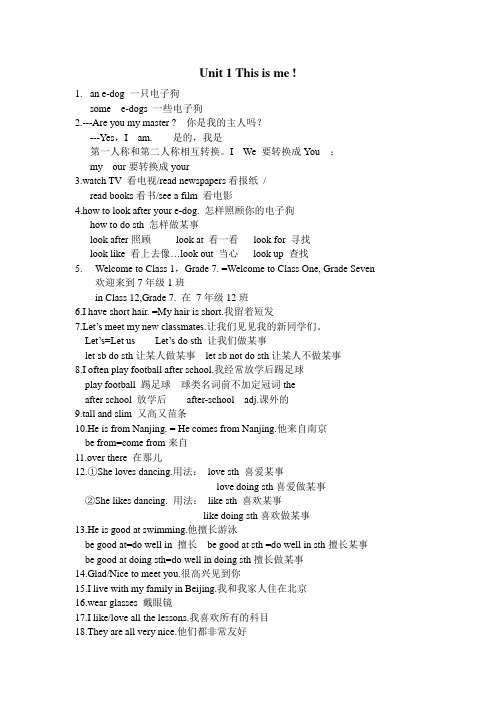
Unit 1 This is me !1.an e-dog 一只电子狗some e-dogs 一些电子狗2.---Are you my master ? 你是我的主人吗?---Yes,I am. 是的,我是第一人称和第二人称相互转换。
I We 要转换成You ;my our要转换成your3.watch TV 看电视/read newspapers看报纸/read books看书/see a film 看电影4.how to look after your e-dog. 怎样照顾你的电子狗how to do sth 怎样做某事look after照顾look at 看一看look for 寻找look like 看上去像…look out 当心look up 查找5.Welcome to Class 1,Grade 7. =Welcome to Class One, Grade Seven欢迎来到7年级1班in Class 12,Grade 7. 在7年级12班6.I have short hair. =My hair is short.我留着短发7.Let’s meet my new classmates.让我们见见我的新同学们。
Let’s=Let us Let’s do sth 让我们做某事let sb do sth让某人做某事let sb not do sth让某人不做某事8.I often play football after school.我经常放学后踢足球play football 踢足球球类名词前不加定冠词theafter school 放学后after-school adj.课外的9.tall and slim 又高又苗条10.He is from Nanjing. = He comes from Nanjing.他来自南京be from=come from来自11.over there 在那儿12.①She loves dancing.用法:love sth 喜爱某事love doing sth喜爱做某事②She likes dancing. 用法:like sth 喜欢某事like doing sth喜欢做某事13.He is good at swimming.他擅长游泳be good at=do well in 擅长be good at sth =do well in sth擅长某事be good at doing sth=do well in doing sth擅长做某事14.Glad/Nice to meet you.很高兴见到你15.I live with my family in Beijing.我和我家人住在北京16.wear glasses 戴眼镜17.I like/love all the lessons.我喜欢所有的科目18.They are all very nice.他们都非常友好They all like our school. 他们都喜欢我们的学校。
Unit1LanguagePoints阅读课语言点高中英语外研版必修第二册

p.3 But I enjoy that sort of food myself.
高中英语 必修第二册 UNIT 1 Food for thought
sort n. & v. • (1)n. 种,类 • 搭配: all sorts of(=all kinds of)各种各样的(名词前) of all sorts 各种
• (1) This sort of 高中英语 必修第二册 UNIT 1 Food for thought (这种)wet weather is bad for our knees.
• (2)Films of that sort (那种) have lost their appeal for me.
a lot of
高p中.英3语H必修e第二a册lsUoNITd1 oFoeodsforathotugyhtpical Sunday roast.
typical adj. 典型的,有代表性的;不出所料的
• 搭配:
• be typical of... 是典型的…… It is typical of sb. to do sth. 做某事是某人的特点。
• (6)Rubbish can easily be separated and sorted into
plastics,(7)Sort out any clothes you want to throw away and give them to me.
• (8)We had a very productive meeting—I felt we sorted out problems.
weight quickly.
• (5)Some insects take on protect themselves.
全新版大学英语2(第二版) UNIT1 语言点
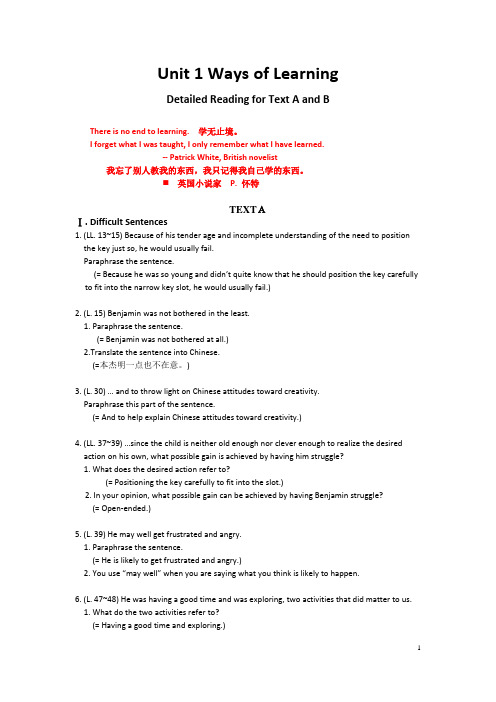
Unit 1 Ways of LearningDetailed Reading for Text A and BThere is no end to learning.学无止境。
I forget what I was taught, I only remember what I have learned.-- Patrick White, British novelist我忘了别人教我的东西,我只记得我自己学的东西。
英国小说家P. 怀特TEXTAⅠ. Difficult Sentences1. (LL. 13~15) Because of his tender age and incomplete understanding of the need to position the key just so, he would usually fail.Paraphrase the sentence.(= Because he was so young and didn’t quite know that he should position the key caref ully to fit into the narrow key slot, he would usually fail.)2. (L. 15) Benjamin was not bothered in the least.1. Paraphrase the sentence.(= Benjamin was not bothered at all.)2.Translate the sentence into Chinese.(=本杰明一点也不在意。
)3. (L. 30) … and to throw light on Chinese attitudes toward creativity.Paraphrase this part of the sentence.(= And to help explain Chinese attitudes toward creativity.)4. (LL. 37~39) …since the child is neither old enough nor clever enou gh to realize the desired action on his own, what possible gain is achieved by having him struggle?1. What does the desired action refer to?(= Positioning the key carefully to fit into the slot.)2. In your opinion, what possible gain can be achieved by having Benjamin struggle?(= Open-ended.)5. (L. 39) He may well get frustrated and angry.1. Paraphrase the sentence.(= He is likely to get frustrated and angry.)2. You use “may well” when you are saying what you think is likely to happen.6. (L. 47~48) He was having a good time and was exploring, two activities that did matter to us.1. What do the two activities refer to?(= Having a good time and exploring.)2. Paraphrase two “activities that did matter to us”.(= Tow activities that were important to us.)7. (L. 52) …whether it be placing a key in a key slot, drawing a hen or making up for a misdeed…1. Paraphrase the sentence.(= No matter whether it is placing a key in a key slot, drawing a hen or making up for some mistakes.)2. Analyze the structure of the sentence.(= The subjunctive mood is used here.*Whether he be present or absent, we shall have to do our part.)8. (LL. 80~81) …young Westerners making their boldest departures first and then gradually mastering the tradition…1. What does making their boldest departures mean?(=Doing sth. different from an established rule or tradition.)2. Translate this part into Chinese.(=西方的年轻人先是大胆创新,然后逐渐深谙传统。
人教版高中英语必修一Unit1语言点

Unit 1 Friendship学习目标重点词汇与短语add up, upset, ignore, point, calm, concern, cheat, go through, set down, purpose, dare, power, suffer, settle重点句型1. It/ This/ That is(was)+the first/the second/...time that从句2. While/ When doing...3. It is ... doing...知识讲解重点词汇upset【原句回放】Your friend comes to school very upset. 你的朋友来上学时心烦意乱。
【点拨】upset adj. 心烦意乱的;不安的;不适的(通常不置于名词前)What made you so upset? 什么让你心烦意乱?be upset about/over/at sth. 为某事烦心She was really upset about the way her father treated her. 她为父亲对她的态度而烦恼。
He was upset at not being welcomed. 他因不受人欢迎而生气。
vt. (upset,upset,upsetting) 使不安;使心烦;弄翻,打翻;打乱,扰乱(计划等)His father’s death upset him very much.他父亲的死去让他心烦。
A large wave upset the boat. 大浪打翻了那条船。
upset a plan打乱计划Our arrangements for the weekend were upset by her visit.她的造访打乱了我们周末的安排。
The rain upset our plan for a picnic.大雨打乱了我们野炊的计划。
人教版高中英语必修一Unit1语言点

高中英语学习材料madeofjingetiejiUnit 1 Friendship学习目标重点词汇与短语add up, upset, ignore, point, calm, concern, cheat, go through, set down, purpose, dare, power, suffer, settle重点句型1. It/ This/ That is(was)+the first/the second/...time that从句2. While/ When doing...3. It is ... doing...知识讲解重点词汇upset【原句回放】Your friend comes to school very upset. 你的朋友来上学时心烦意乱。
【点拨】upset adj. 心烦意乱的;不安的;不适的(通常不置于名词前)What made you so upset? 什么让你心烦意乱?be upset about/over/at sth. 为某事烦心She was really upset about the way her father treated her. 她为父亲对她的态度而烦恼。
He was upset at not being welcomed. 他因不受人欢迎而生气。
vt. (upset,upset,upsetting) 使不安;使心烦;弄翻,打翻;打乱,扰乱(计划等)His father’s death upset him very much.他父亲的死去让他心烦。
A large wave upset the boat. 大浪打翻了那条船。
upset a plan打乱计划Our arrangements for the weekend were upset by her visit.她的造访打乱了我们周末的安排。
The rain upset our plan for a picnic.大雨打乱了我们野炊的计划。
人版高中英语必修一Unit1课文语言知识点

Should have done练习
• 用所给动词的适当形式填空
• 1. –I missed the first part of the film. It was really a pity.
• -You
(leave)home an hour earlier.
• 2. I was really anxious about you.
• 强调句:
Reading
• It is/was +被强调部分+that/who+其他成分
• 用来强调除谓语以外的其他成分,如主语、宾语、状语等 • 强调谓语用do、does、did
• Mary lost her watch yesterday.
• It was yesterday that Mary lost her watch.
• The teachers have gone through all the paper of the students.
• 老师们已经批阅了学生们的试卷。 • 3.通过(考试、议案)=get through • He has gone through the exam. 他通过了考试。 • 4.完成,做完
the problem .
• 4. It’s +形容词/名词+连词+名词性从句/to do sth./ doing sth.
• It will become more and more important to have a good knowledge of English .
• It’s a pity that I didn’t think of it earlier. • It’s no use going there so early.
- 1、下载文档前请自行甄别文档内容的完整性,平台不提供额外的编辑、内容补充、找答案等附加服务。
- 2、"仅部分预览"的文档,不可在线预览部分如存在完整性等问题,可反馈申请退款(可完整预览的文档不适用该条件!)。
- 3、如文档侵犯您的权益,请联系客服反馈,我们会尽快为您处理(人工客服工作时间:9:00-18:30)。
3). mean sb. to do sth. 打算让某人来做某事 e.g. I mean him to do the job. 4). had meant to do sth, but … = meant to have done sth, but … 本打算做…(但并未做成) e.g. I had meant to help him, but I was too busy. 或:I meant to have helped him, but I was too busy.
那座塔俯瞰整个城市。 The tower dominates the whole city. dominant adj. 支配的,统治的, 居高临下的
15. imitates its surroundings 模仿它的周围环境 模仿他父亲的言行: imitate what his father says and does
be concerned with
与…有关
这本书与老人的精神问题有关。 e.g. The book is concerned with mental problems of the old.
* be concerned about 为…担心
20. concern n. 担心,忧虑,焦急 a concern about sb. / sth.
那些旧屋正在被拆除。
The old houses are being pulled down.
are being knocked down.
are being torn down. 那场感冒使我身体虚弱。 The cold pulled me down.
9. The tower proves to be the most popular place in Paris. 结果证明它是巴黎最受欢迎的地方。 1)prove sth. to sb. 向某人证明… 向我们证明你的理论: prove your theory to us
the Eiffel Tower (France)
Scan passage 1 and answer the following questions.
1. What was the Eiffel Tower built for? for the 1889 World Exposition in Paris 2. How high is the Eiffel Tower? 300 meters high 3. Why did people from all over the world still go to Paris after the World Expo closed?
11. the symbol of the City of Light 光城的象征
symbolize vt. 象征…
the Sydney Opera House (Australia)
1. Where is the Opera House situated?
2. What is the shape of the Opera House?
imitation n.
16. resemble a ship’s sails 类似于船帆 resemble vt. 类似,相似 (无被动,无进行) resemble sb. / sth. in… 在…方面与…相似 她与她姐姐外表相似但性格不同。 She resembles her sister in appearance but not in character.
18. have numerous disagreements with the local government 和当地政府有很多意见不合 reach an agreement with sb 与…达成一致协议
19. be concerned with the interior finishing 与内部完善有关
bear a resemblance to sb / sth 与…相似, 与…相像
17. in connection with the Opera House
与歌剧院有关
in connection with = in relation to 与…有关
警察就他妻子失踪一事和他谈了谈。 The policeman talked with him in connection with his wife’s disappearance.
4. in celebration of =to celebrate
为了庆祝…:
他举行宴会来庆祝母亲的八十岁生日。 He held a party in celebration of his mother’s 80th birthday. 5. the French Revolution 法国大革命
一. 在wish后宾语从句中的用法.
{ I wish I could go with you
now. In fact I can’t go swimming with you now.
I can go swimming with you now.
More help will come soon. I wish more help would come soon. I’m not sure whether more help will come soon. Charlie didn’t take too much medicine yesterday. I wish that Charlie hadn’t taken too much medicine yesterday. In fact Charlie took too much medicine yesterday.
3. What are the adj.s used in the text to describe the beauty of the Opera House? 4. Who designed the Opera House?
5. How many stages were the construction experienced? And what are they?
just to see the Eiffel Tower
2. even if 即使 = even though 3. name A after B 以B命名A A be named after B A以B命名
例: 这座桥以一位英雄的名字命名。 The bridge was named after a hero.
e.g. a concern about pollution 1. e.g. The story concerns a girl in a distant village. vt. 关于 2. The matter concerns everyone here. vt. 关系到
The Subjective Mood (4) Wish
10. just to see the Eiffel Tower 就是为了看埃菲尔铁塔 just to do sth. 就是为了做某事 (表目的) only to do sth 结果… (表结果) 她匆匆回家就是为了照顾生病的孩子。 She hurried home just to take care of the sick child. 她匆匆赶到车站,结果发现火车已经开走了。 She hurried to the station only to find the train gone.
sea shells
3. What are the adj.s used in the text to describe the beauty of the Opera House? dramatic; unforgettable
4. Who designed the Opera House?
The prominent Danish architect, Joern Utzon.
13. be situated + 地点状语 =be located + 地点状语
我们的学校位于城中心。 Our school is situated in
位于…
is located in
the centre of the town.
14. dominate the harbor 俯瞰海港 dominate vt. 俯瞰,控制
6. Translate: It is as representative of Australia as the pyramids are of Egypt.
1. Where is the Opera House situated?
On Bennelong Point, which…
2. What is the shape of the Opera House?
5. How many stages were the construction experienced? And what are they?
Three. …got underway in 1959; 1962-1967; 1967-1973 6. Translate: It is as representative of Australia as the pyramids are of Egypt.
2) sb. / sth. prove (to be) + adj./n. 结果证明某人/某物是… The performance proved (to be) successful. The performance proved (to be) a success.
3) prove sb / sth (to be) + n / adj. 证据证明她是无辜的。 The evidence proved her (to be) innocent. n. proof 证据
